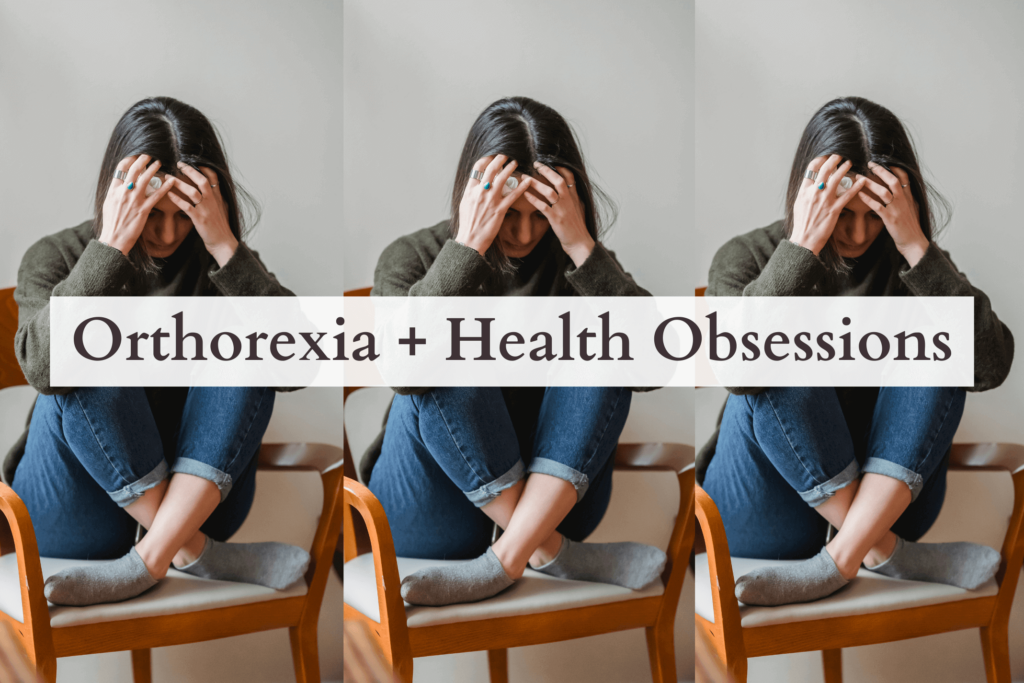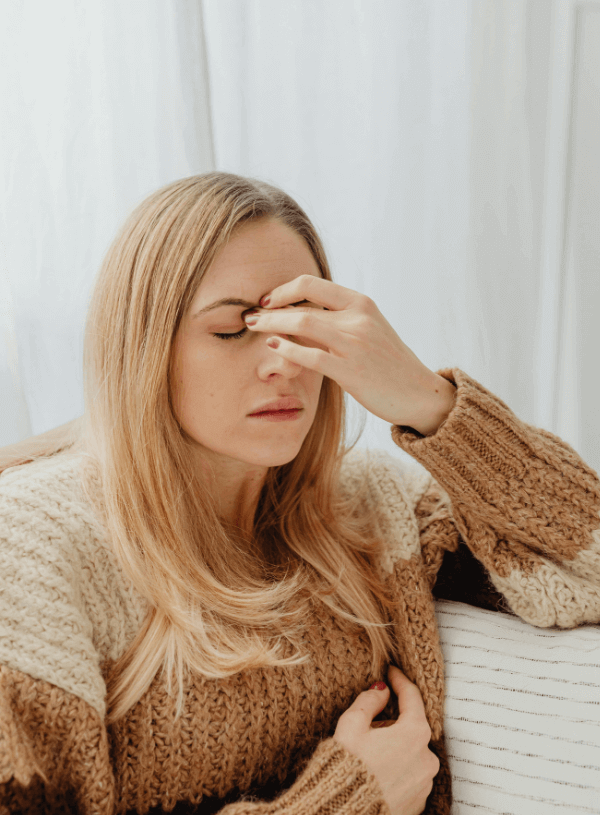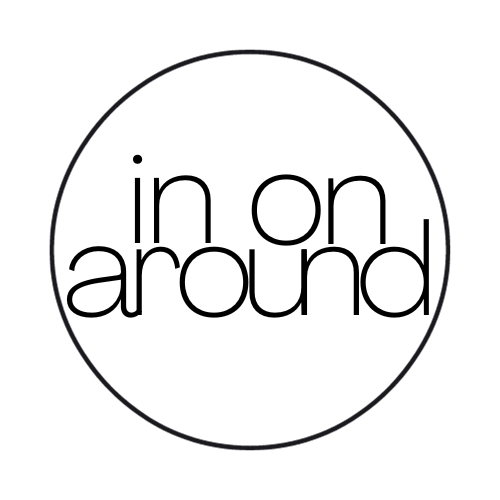You’re familiar with the saying “too much of a good thing,” right? Well, the same principle applies to your pursuit of health. Although it’s absolutely fantastic to see people prioritizing health and wellness, it’s crucial to recognize that obsession with this pursuit can be unhealthy – this is where orthorexic behaviors can present themselves. So, what is orthorexia nervosa? Are obsessions with food healthy? How do you know if you’re experiencing signs of orthorexia?
Keep reading to learn more about orthorexia and unhealthy obsession with food. Let’s dive into all the details!

Note: This article contains affiliate links, meaning In On Around will make a small commission at no additional cost to you. This helps us maintain the site. As always, we value full transparency & only work with brands we love and trust.
This article is co-authored by Kendall Bierman, MHC-LP and Catherine Power.
- Published On: April 22, 2024
- Updated On: April 24, 2024
Table of Contents
What is Orthorexia Nervosa?
In short, orthorexia nervosa is an unhealthy obsession with healthy eating. Let’s explain….
According to 2017 report, orthorexia nervosa (also referred to as ON) is “an obsession with healthy eating with associated restrictive behaviors.” [1] Ironically, in an attempt to eat healthfully, a person with orthorexia may develop an obsessive and unhealthy relationship with food. In striving for optimal health through a focus on diet, one may inadvertently experience malnourishment, deterioration of relationships, and a diminished overall quality of life. [2]
Someone with orthorexia may begin to eliminate entire food groups in an attempt to be healthy. Violations of a self-imposed dietary rule may cause intense health anxiety, fear of disease, general anxiety, and shame. [3]
Additionally, someone with orthorexia may feel intense emotional distress when they perceive their food choices as unhealthy. The obsession to eat healthfully may lead to compulsive behaviors and preoccupations such as following a strict diet or living by a certain dietary theory that is restrictive. These dietary restrictions tend to escalate over time and may eventually exclude entire food groups. Additionally, someone with ON may find themselves engaging in more frequent and/or severe “detoxes” (which are partial fasts) in an effort to purify or cleanse his/herself. [4, 5, 6]
Is Orthorexia Nervosa a Real Diagnosis?
Though orthorexia nervosa is not listed in the DSM-5 as a mental disorder in its own right, orthorexia is very real and may signify the existence of an eating disorder. In fact, it may be considered as an “unspecified” feeding and eating disorder, meaning the clinician doesn’t think they meet the criteria for other disorders.
So what does an “unspecified” disorder mean? Well, orthorexia is an unspecified feeding and eating disorder. An unspecified diagnosis is “used in situations in which the clinician chooses not to specify the reason that the criteria are not met for a specific… disorder”.
Someone with orthorexia may be very negatively impacted by their disorder, however, they do not properly meet the criteria of any specific feeding or eating disorder. This does not mean that what they are struggling with is invalid or non-detrimental. In fact, orthorexia can be quite harmful to the person faced with it and to the loved ones of the person with orthorexia.

Warning Signs of Orthorexia Nervosa
There are many potential warning signs that you may have an unhealthy relationship with healthy living. According to the National Eating Disorder Association (NEDA), warning signs can include: [7]
- Compulsively checking food labels with fear and overwhelm
- An increase in concern about the health of ingredients
- Spending hours thinking about what food might be served at events
- Getting extremely stressed when “healthy” or “safe” foods aren’t available
- Cutting out an increasing number of food groups without some level of balance (all sugar, all carbs, all dairy, all meat, all animal products)
- An inability to eat anything but a narrow group of foods (ex: depriving yourself of enjoying any dessert)
- Obsessive interest in the health of what others are eating
- Experiencing a sense of superiority regarding their dietary choices and displaying intolerance towards others’ food behaviors and beliefs.
- Letting healthy eating seriously impact your social life … and more.
There is a fine line between wanting to eat healthy and being obsessed with healthy eating. There must be a rational level of balance!
What Causes Orthorexia?
Like any disorder, there is no one direct cause for orthorexia. However, there are factors that contribute to its development, such as:
- Development of food preferences
- Fear of new foods or pickiness
- A history of parental eating disorders
- Preoccupation with becoming overweight
- Other types of mental disorders… and more.
Many disorders have a high level of comorbidity with other diagnoses. For instance, those with Anorexia Nervosa are likely to also struggle with Generalized Anxiety Disorder (GAD). Someone with Orthorexia Nervosa might have a history of an eating disorder, health anxiety disorder, or Obsessive Compulsive Disorder (OCD). This means that having one of those other disorders may increase your likelihood of developing orthorexia. [8]
How Common is Orthorexia?
Since orthorexia isn’t an official diagnosis, there are only a few studies analyzing how common it is. A couple of studies estimate that orthorexia affects between 1% and 7% of the general population. Interestingly, this disorder seems to disproportionately affect women, with statistics indicating that it’s twice as common in women compared to men. In fact, a substantial portion of the population, ranging from 21% to 57.6%, may exhibit eating behaviors characteristic of orthorexia – but this is still preliminary research that needs to be studied more (and much of it can be related to common dieting patterns).
Another study estimates that about 10% of the population is deemed at risk for developing orthorexia. In fact, some reports also show that individuals who adhere to a vegan diet may be particularly susceptible to orthorexia. All-in-all, this is a complex disorder and a LOT more research is needed to understand its prevalence. [9, 10, 11]

Diagnosing Orthorexia Nervosa
Orthorexia nervosa is not an “official” diagnosis, so there are no official diagnostic criteria. However, there are a handful of tools a healthcare professional may use to assess someone to ON.
It’s essentially an eating disorder that doctors and therapists aren’t allowed to diagnose, since it’s not a “recognized” disorder, but some proposed diagnostic tools include:
- ORTO-15: This tool consists of 15 questions used to spot behavioral symptoms of orthorexia. A score of 40 indicates a diagnosis. Some criticize this tool though because it doesn’t differentiate between following a healthy diet versus pathological “healthy” eating. [12]
- ORTO-R: This is an updated version of the ORTO-15, which focuses on six, rather than 15, questions about symptoms and behaviors related to orthorexia.
- Bratman Orthorexia Test (BOT): This includes 10 “yes/no” questions that ask about obsessive thoughts about food, beliefs about health and nutrition, dietary restrictions, and other related factors.
- Eating Habits Questionnaire (EHQ): This questionnaire has 21 items and assesses knowledge, positive and negative feelings, and problematic behaviors related to healthy eating. However, studies have indicated that it requires refinement before it can be considered a reliable diagnostic tool for orthorexia.
More recently, Bratman and Dunn (2016) presented a two-part criteria to better differentiate between healthy eating and orthorexia. The two parts include both:
- An obsessive focus on healthy eating
- Behaviors that disrupt daily life.
Negative Health Effects of Orthorexia
There are many negative health effects of orthorexia… some psychological, some physical. Let’s chat about the potential psychological effects of orthorexia first…
Due to the compulsive nature of the eating behaviors and the mental preoccupation, it is very emotionally taxing. It can substantially impact social, academic, and vocational functioning. People with orthorexia often tie their self-worth to how well they stick to their healthy eating habits, and it can be nearly all they think about.
If you’re struggling with orthorexia, speak with a licensed therapist. Consider using the 80/20 rule to bring more balance into your daily life. You can learn more about that here: 80/20 Rule: Healthy Balance with Diet and Exercise.
Body image, self-worth, identity, and happiness can all become dependent on their self-defined eating habits. When these rules are “broken” it can cause severe emotional distress. Though there is limited research on the effects of ON, since it’s not an official diagnosis, the disorder will likely lead to many of the same negative health effects as other eating disorders.
Physically, orthorexia may cause severe weight loss (leading to malnutrition and other complications). Restrictive eating may cause medical complications such as anemia or an abnormally slow heart. If you’re malnourished, that can lead to digestion issues, weakness, lowered immunity, and more. [13]
How to Treat Orthorexia
Like other eating disorders, orthorexia is best treated with a multidisciplinary team approach. It’s always best to consult with a physician, since any eating disorder can have a major impact on your physical health. It’s also best to loop in a psychotherapist and holistic nutritionist or dietician to assess eating patterns.
Of course, the amount of treatment needed depends on the severity of the illness, and this can change from person to person. If someone has lost a substantial amount of weight, they should speak with a doctor ASAP and consider hospitalization. Most of the time, an outpatient setting for eating disorder treatment will suffice.
While in outpatient treatment, a psychotherapist might use cognitive behavioral therapy (CBT) to address the perfectionism and irrational thought patterns of someone with orthorexia. Exposure and response prevention (ERP) may also be beneficial in that it could reduce the OCD behaviors associated with ON.
Additionally, relaxation techniques and mindfulness may help reduce mealtime anxiety. Psychoeducation is another important treatment for ON, as it may help correct inaccurate beliefs about “healthy” vs “unhealthy” foods and eating. Since all of these interventions may be helpful to someone with ON, it is best that treatment includes a holistic approach, pulling from more than one therapeutic approach. [14]
Final Thoughts: What is Orthorexia Nervosa? Obsessions with Food 101
If you struggle with orthorexia, it’s time to ask for help. Ask yourself: do you exhibit any of these symptoms? Are you obsessing over healthy eating a little too much? Remember: it’s great to strive for health, but you need to be careful not to become “obsessed” with healthy living or healthy eating. Strive for an 80/20 balance for both your physical and mental health.
You can also learn more from organizations like the Eating Disorders Association and the National Eating Disorders Association which provide great resources and support. Cheers to feeling empowered to make nourishing food choices without overwhelm or fear.
Did you know this about orthorexia?
Let me know your thoughts and key takeaways in the comments below!
xoxo,

Want to read more? Check out our other articles here!
Other references on What is Orthorexia Nervosa? from:
Healthline, National Eating Disorders Association, Eating Recovery Center, Center for Discovery, The Recovery Village
Copyright In On Around LLC 2024 ©. The statements made on this website have not been evaluated by the FDA (U.S. Food & Drug Administration). They are not intended to diagnose, treat, cure, or prevent any disease. The information provided by this website should not be used as individual medical advice and you should always consult your doctor for individual recommendations and treatment. The information contained in this site is provided on an “as is” basis. Related to this site, there are no guarantees of completeness, accuracy, usefulness, or timeliness. In On Around LLC assumes no responsibility or liability for any errors or omissions in the content of this site.
Frequently Asked Questions – What is Orthorexia Nervosa? Obsessions with Food 101
Click on the below FAQs to learn more about: dietary restrictions escalate, restrictions escalate over, american psychiatric association, and exaggerated emotional distress from imposed dietary rules.
Orthorexia differs from anorexia and bulimia in that it focuses on an obsession with consuming only healthy foods, rather than primarily on quantity or control of food intake
The potential health consequences of orthorexia include nutritional deficiencies, weakened immune system, gastrointestinal issues, and heightened anxiety or depression related to food and eating.
Yes, there are effective treatments and therapies available for orthorexia nervosa, including cognitive-behavioral therapy (CBT), nutritional counseling, and support groups aimed at addressing distorted thoughts and behaviors related to food and body image.
Friends and family members can support someone struggling with orthorexia by offering non-judgmental listening, encouraging professional help, promoting a balanced approach to food, and fostering a supportive and understanding environment for their recovery journey.








